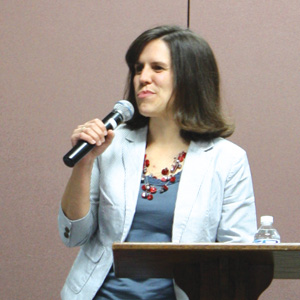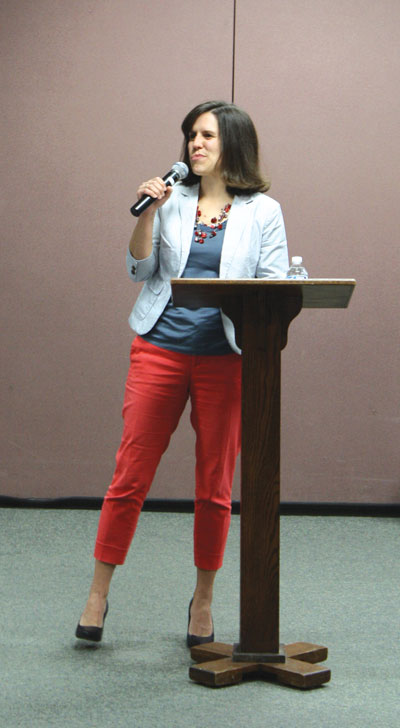
Christian formation throughout the life course
by Sarah Ann Bixler
PhD candidate in practical theology at Princeton Theological Seminary and instructor of formation and practical theology at Eastern Mennonite Seminary

Sarah Ann Bixler presented Christian Formation Throughout the Life Course at a resource session with congregational delegates at VMC Assembly in July. Photo: Jon Trotter
These seasons are described in the book Calling All Years Good by Kathleen Cahalan and Bonnie Miller-McLemore. Starting with the precious season of childhood, Miller-McLemore affirms that “children often know themselves as deeply faithful.” Jesus lifted up a child’s faith as an example for all. Children have a natural capacity for spiritual connection, and this does not depend on intellectual development. This natural capacity, however, needs to be nurtured by a spiritual community.
Children live with immediacy, paying careful attention to the present. Along with their great openness and sense of trust, they are deeply vulnerable. Children, in need of protection and care from birth, form attachments to persons who care—or hardly care—for them. These childhood experiences impact relationships throughout life, including a relationship with God.
If connection with God, self or others does not happen regularly in adolescence, it will be more difficult to develop in adulthood.
Adolescence is the time Western cultures have marked as starting with puberty, around age 10. This is a time of great change in the body and brain, opening new capacity for self-reflection, taking other people’s perspectives and holding different views in tension. For persons with developmental disabilities, though not all physical and cognitive changes occur to the same extent as other teens, they too can grow in their capacity to connect with themselves, others and God. Tending these connections is especially critical in adolescence, because during this time the brain is busy pruning away neural pathways for connections and behaviors that aren’t used. If connection with God, self or others does not happen regularly in adolescence, it will be more difficult to develop in adulthood. Formative practices in the church, therefore, are very important during adolescence.
Although adolescents are becoming more socially aware, solitude and self-reflection are very important for them. Adolescents begin to locate themselves in terms of racial, gender, sexual, national and class identities. Like children, adolescents have faithful questions. Engaging these questions in a safe community lays an important foundation for faith throughout the rest of the life course.
In late adolescence and early adulthood, from approximately age 18 through the early 30s, claiming one’s identity is at the fore. This is a time of major transitions for those with enough privilege to have choices about their life, and all these transitions can lead to a sense of impermanence. For those without choices, early adulthood can bring a deepening sense of hopelessness and being stuck.
In many congregations, the ways that early adults used to be involved are no longer available to them. They have outgrown children’s and youth activities, and they may now face a choice about church attendance for the first time in their life. The Barna Group reports that 59% of early adults with a Christian background have, at some point, dropped out of going to church after having gone regularly. The transition into being an adult in the faith community can be confusing, but it helps for congregations to be attentive to individuals and their particular needs. A one-size-fits-all program will not offer what early adults need to flourish.

A slide from author Sarah Ann Bixler’s presention at Conference Assembly. The Assembly theme of “Cultivating Good Soil” comes through in faith formation, as Bixler exhorted the audience to focus more on the soil conditions that vary among individuals and require time and attention over a focus on visible outcomes.
When we think about Christian formation, we often think of children, youth and young adults. But what about adults? Their Christian formation is ongoing. During middle adulthood, approximately age 35 until retirement, people question long-held values and beliefs, especially when they encounter change and loss in life. Middle adults naturally seek intimacy, and sadly, more than half of American marriages end within five years. Middle adults may be caring both for children and aging parents. They face competing priorities and are figuring out which dreams still seem possible in light of reality.
For persons across all times of life, inter-generational community is crucial for Christian formation.
For American middle adults, there are often changes in employment, which may require additional schooling. Part of this may reflect their search for meaning in life, which brings some middle adults back to the church. They often fill important roles in the community and the church, holding the most powerful positions in American society. They want to shape younger generations, based on their own commitments and regrets.
In later adulthood, adults who were employed may choose or long for retirement. They consider the legacy they will leave and what life has meant to themselves and others, sometimes with a sense that it isn’t too late to do something new and meaningful. There can be a healthy sense of transition, passing on wisdom and practices to great-nieces and nephews, grandchildren and younger generations in the church.
Yet, later adulthood can be challenging with an uncertain sense of time, loss of loved ones, physical decline and financial limitations. Fearing or embracing death raises deep questions about faith. This can lead to a strong desire for reconciliation with one’s self, others and God.
For persons across all times of life, inter-generational community is crucial for Christian formation. The church has often expected adults to form children in faith, but children form adults, too. The youngest children can cultivate adults’ spiritual growth because they see and hear what adults fail to notice. Mennonite theologian Nancy Bedford reminds us that children can raise important questions for spiritual discernment in faith communities. When people in congregations grow together in faith across the various seasons of life, they have the greatest potential for healthy Christian formation.
Participating in God’s formation of faith is an exercise in spiritual discernment, as we attend to and celebrate the particularity of each person. With all persons, it’s important to not just understand expected patterns, but to pay attention and nurture growth in all people whom God has uniquely created. In this way, Christian formation can flourish throughout the life course.
View the Christian Formation throughout the Life Course slide presentation from Conference Assembly 2019
